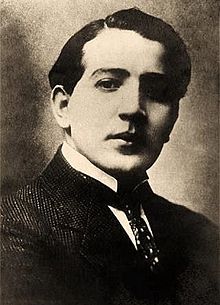Ossip Ivanovich Runitsch
Ossip Iwanowitsch Runitsch ( Russian Осип Иванович Рунич , also Osip Runich and Giuseppe Runitsch ; born as Fradkin (Russian: арадкин ); * 1889 in the Russian Empire ; † April 6, 1947 in Johannesburg , South Africa ) was a Russian actor and theater director .
Live and act
Runitsch began his stage career in the last years of tsarist rule in Russia and quickly gained considerable popularity at the Moscow Art Theater and the St. Petersburg Hermitage Theater. He was then brought to film during the First World War, where he took on leading roles, especially in literary adaptations. In one of his first and most important appearances in front of the camera, the Tolstoy film adaptation of War and Peace , Runitsch played Nikolai Rostov. Shortly after the October Revolution , his film career came to an end for the time being, and Runich joined the entourage of numerous Belarusian-minded artists who left the Bolshevik country for Western Europe.
At first he found employment at the Theater of Russian Drama in Riga, Latvia . In 1919 he moved on to Italy . Once there, Runitsch, now Italianized his first name in Giuseppe, briefly resumed his film activity in 1920. In the same year he decided to move to Germany . In Berlin he was a popular actor in major supporting roles until the end of the decade. He was occupied several times as director and nobleman, but he also played a revolutionary (in the Danton film adaptation of 1921). He also played leading roles in some productions by Russian exile directors such as Dimitri Buchowetzki , Nikolai Malikoff, Georg Asagaroff and Wladimir Strijewski . In addition to his film work, Runitsch also took on the role of President of the Union of Russian Performing Artists in Berlin.
In 1921 he came to Paris for the first time , where he took part in performances of Russian exile plays, but also in ballets and operas. In his filmless time (1925 to 1928) Runitsch devoted himself to other artistic activities in Paris. He taught at the first Russian academy in the French capital and was on the board of the art group for Russian literature. Runitsch gave readings in Russian and organized such events (including concerts).
Runitsch's German screen career finally came to a standstill with the dawn of the sound film age, probably because he did not have sufficient command of the German language. In 1933 he and his wife, a ballet dancer, accepted an invitation from Jewish artist friends and settled in South Africa. Runitsch founded his own venue there, the Johannesburg Studio. His specialty was now the classical Russian theater and musical performances. The Russian exiled staged operas and directed several times there. In addition, Runitsch joined the Society of Friends of the Soviet Union there.
Filmography (selection)
- 1915: Wojna i mir (Russian: Война и Мир)
- 1915: Oboschennije krilja (Russian: Обожженные крылья)
- 1917: Istersannije duschi (Russian: Истерзанные души)
- 1917: Schiwoj trup (Russian: Живой труп)
- 1918: Poslednije tango (Russian: Последнее танго)
- 1920: Lord Bluff
- 1920: La catena
- 1920: The beast in humans
- 1921: Danton
- 1921: Playing with fire
- 1922: Psicha, the dancer Catherine the Great
- 1922: Infernal power
- 1922: Marie Antoinette
- 1923: your misstep
- 1923: The Kiang-Ning puppet maker
- 1924: Spring floods
- 1924: Taras Bulba
- 1924: Prater
- 1924: The golden calf
- 1928: Diary of a cocotte
- 1929: Sensation in the winter garden
- 1930: The Don Cossack Song
Remarks
- ↑ The engl. Wikipedia dates this Riga episode to the end of the 1930s
- ↑ The engl. Wikipedia names the exile South Africa only z. At the outbreak of the Second World War and writes that R. is said to have gone to Riga beforehand
Web links
- Ossip Iwanowitsch Runitsch in the Internet Movie Database (English)
- Ossip Iwanowitsch Runitsch at filmportal.de
- Ossip Runich in dommuseum.ru
| personal data | |
|---|---|
| SURNAME | Runitsch, Ossip Ivanovich |
| ALTERNATIVE NAMES | Runich, Osip; Runitsch, Giuseppe; Fradkin (maiden name); Рунич, Осип Иванович (Russian); Фрадкин (Russian) |
| BRIEF DESCRIPTION | Russian actor and theater director |
| DATE OF BIRTH | 1889 |
| PLACE OF BIRTH | Russian Empire |
| DATE OF DEATH | April 6, 1947 |
| Place of death | Johannesburg , South Africa |
